According to statistics, inflammation of the prostate occurs in 15% of the male population. It is a dangerous disease that without treatment leads to the formation of cysts and stones in the prostate gland, erectile dysfunction (impotence) and infertility. You need to know the symptoms of prostatitis in order to consult a urologist in time and cure the disease without consequences. Inflammation is divided into acute and chronic forms, each of which has distinctive features.
Symptoms and signs common to all types of prostatitis
Despite the fact that prostatitis is acute and chronic, experts have identified a number of common symptoms and signs of the disease in men, which are inherent in both conditions: the main first and second.
Moderate pain in the perineum and scrotum
Painful and pulling sensations in the groin are the first sign of prostatitis in men. The symptom is constantly worried. The pain increases and decreases. One cannot pinpoint the location of the discomfort, as the pain is often given in the lower back, the sacral area.
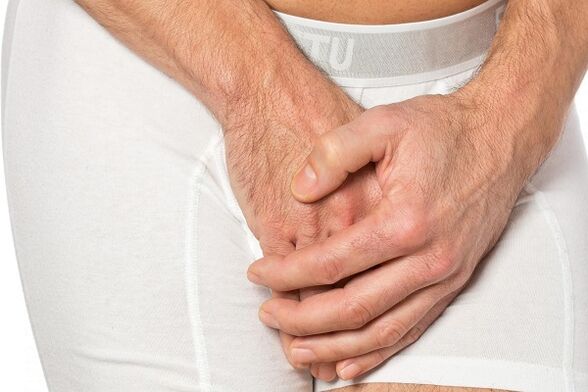
When a symptom occurs, the man tries to sit or lie down, slightly bent and pulling his knees to his abdomen.
Non-steroidal anti-inflammatory drugs (NSAIDs) are used to treat discomfort. The drugs have a good analgesic effect and do not cause serious side effects.
Not recommended for men with gastritis or stomach ulcers.
Increased urination (pollakiuria)
In prostatitis, the man begins to run to the toilet every 1, 5-2 hours. If you drink a few liters of beer or too much water in the heat, the condition becomes completely unbearable: the urge appears every 20-30 minutes.
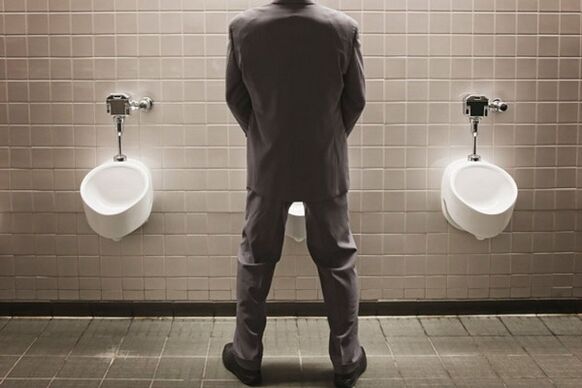
After going to the toilet, there is a feeling of incomplete urination.
No pills will help with polyakiuria. The "drink less water" option also doesn't work in this case. Desires can occur even with a small amount of urine in the bladder.
Illness
Weakness and weakness often appear at the very beginning of the disease. Many do not attach much importance to them, attributing everything to fatigue.
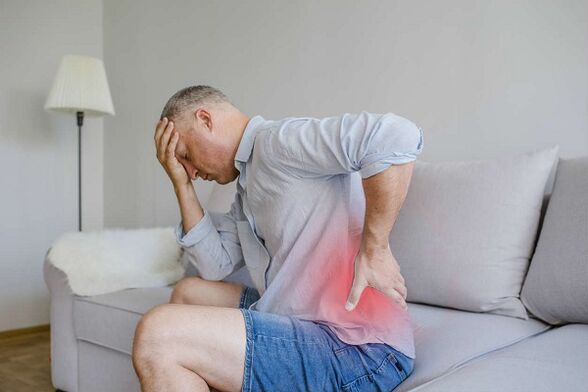
If a man after 40 years suddenly has severe fatigue, incomprehensible painful sensations in the muscles and joints, decreased interest in work, this may indicate the development of prostatitis. This symptom alone does not allow the diagnosis of the pathology, but when combined with 2-3 other symptoms, inflammation of the prostate is very likely.
To improve his well-being, a man should rest more, to normalize everyday life. A good sleep lasting 7-8 hours is very important and you should fall asleep no later than 23 hours. Vitamins will have a good effect both in natural form and in the form of food supplements (recommended for use after personal consultation with a specialist).
Slow stream of urine
Urination with too weak and short jet, spray in all directions are typical complaints of men who face inflammation of the prostate gland. Seeing such a problem, a man tries to strain and squeeze a "powerful flow", but nothing happens. Prostatitis is characterized by a slow flow, rather than the excretion of urine in drops, which is more common in prostate adenoma. in the middle and late stages of its development.
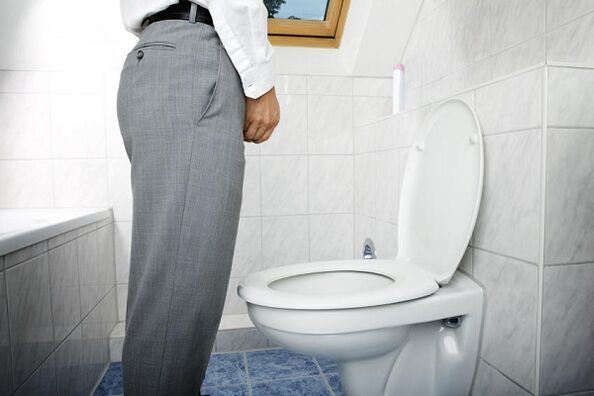
The symptom is mainly associated with swelling or dystrophic changes in the tissues of the prostate gland, which blocks the lumen of the urethra. NSAIDs, which relieve puffiness, may provide some relief in the acute process, but will be ineffective in chronic inflammation. It is possible to remove the swelling at home with the help of prostate massage, but for this the man must have certain skills.
Mucosal discharge from the urethra
Drops of secretion appear on the glans penis during the day. Discharge is due to self-massage of the prostate, which occurs during brisk walking, sports, running. As a result, part of the inflammatory secretion moves through the urethra and is released outside. The mucus is often cloudy, has an unpleasant odor, and sometimes the color is bad.
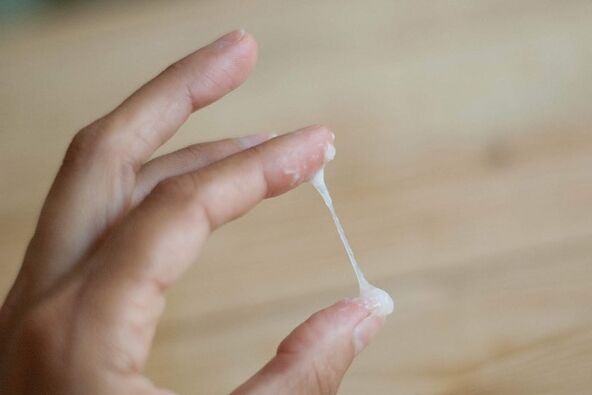
Men who face a symptom must strictly observe hygiene. The genitals should be washed at least 2-3 times a day, as the secretion accumulated on the head is an excellent environment for the reproduction of pathogenic bacteria. The genitals can be rinsed with an antiseptic solution or a decoction of chamomile, which helps to destroy harmful microorganisms.
Pain when urinating
Symptoms of prostatitis include cramps and burning sensations (burning) in the urethra that occur during urination. The discomfort is more pronounced in the morning, as a large amount of inflammatory exudate accumulates in the prostate at night. Rezi bothers the man not only during intercourse, but also within 15-20 minutes after it.
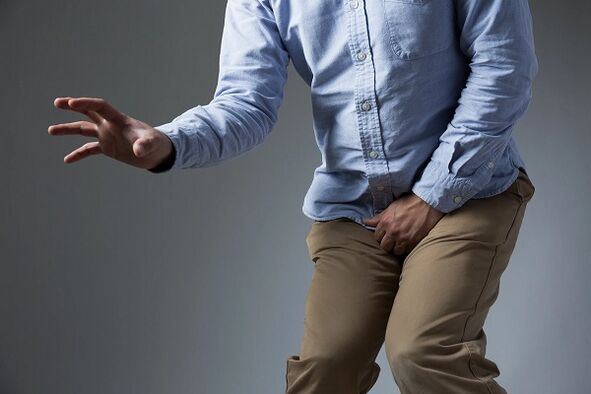
To reduce the discomfort, you can use drugs from the group of herbal uroseptics. The drugs have antimicrobial and anti-inflammatory action, relieve symptoms and prevent inflammatory diseases of the urethra on the background of prostatitis.
Imperative impulse
Men describe this feeling as a sudden and painful urge to urinate. There is a fear of "not reaching" because the sensations are painful and very strong.
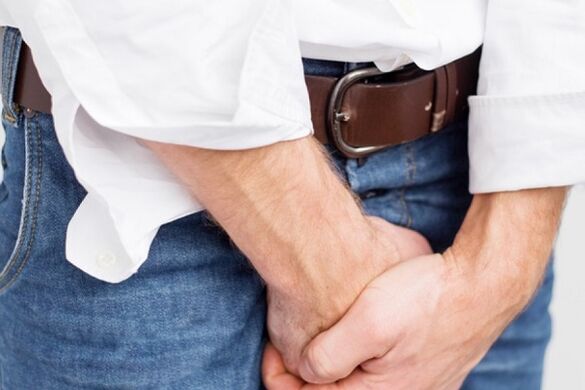
There is often a false desire when the flow of urine does not occur and after a few minutes the pain subsides. Sometimes this symptom is accompanied by urinary incontinence, when a few drops of liquid appear on the laundry.
The only advice from doctors in such a situation is not to try to tolerate the desire. Frequent visits to the toilet cause psychological discomfort, but when an attempt is made to compress the muscles strongly, the pain intensifies.
Acute prostatitis: what hurts at the same time and what sensations of the disease
Acute prostatitis in men has 9 distinctive symptoms, which are observed mainly with an acute manifestation of inflammation of the prostate gland. We will tell you in detail about each.
Painful pain in the groin
Men complain of severe cramps, cramps and unpleasant throbbing in the groin.
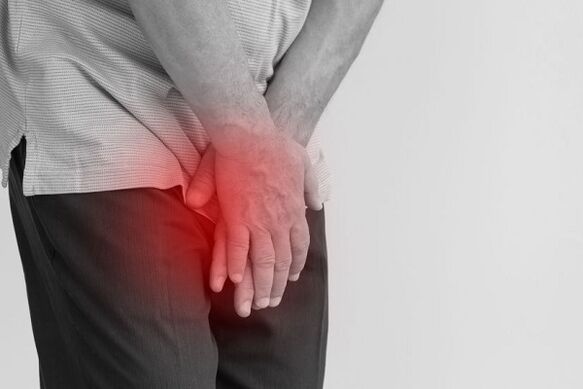
The pain worries the person constantly, increases with prolonged sitting in a stationary position, when urinating. Sometimes the pain is so severe that it is impossible to walk normally.
The symptom appears suddenly, may be preceded by hypothermia or unprotected intercourse.
The discomfort needs to be treated. Pain relievers are used to quickly relieve the symptoms of prostatitis in men. NSAIDs are the drug of choice.
Heat
An active inflammatory process in the prostate gland is always accompanied by a rise in temperature. In acute prostatitis fever reaches values of 39-39, 5 ° C. The body temperature rises suddenly, sometimes before the onset of pain or other typical symptoms.
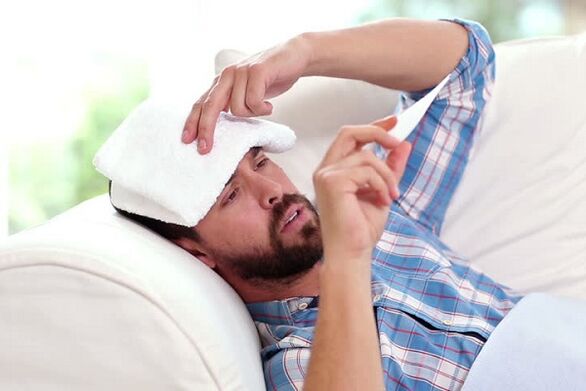
The symptom may be accompanied by alternating periods of chills and increased sweating.
Temperatures above 38 ° C must be lowered. Standard antipyretic drugs are sufficient. You should not use acetylsalicylic acid to lower the temperature. It has many proven side effects when used improperly, so it is best to stick to safe products.
Turbid urine
In prostatitis, the gland secretes an inflammatory exudate that appears during urination.
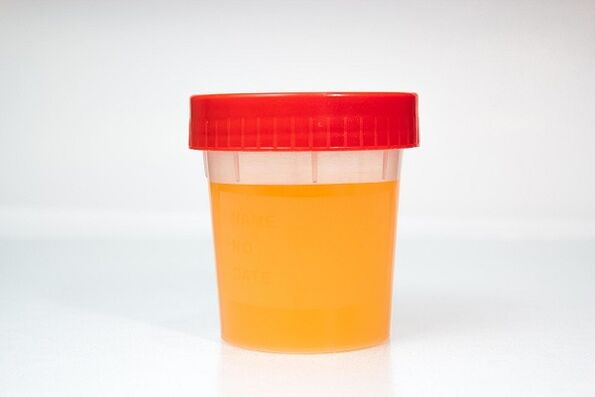
As a result, the urine becomes cloudy, sometimes individual inclusions of mucus or pus can be seen in it. Inflammation of the prostate gland is characterized by a change in the last portion of urine, while at the beginning of urination the jet has a familiar appearance. Turbidity is often accompanied by an unpleasant odor.
If such a symptom occurs, it is worth using drugs from the group of uroseptics. Here are not more suitable herbal medicines, but medicines with antibacterial effect, which are more effective in this case.
Purulent discharge from the urethra
The appearance of a few drops of pus from the mouth of the urethra is a typical sign of bacterial prostatitis.
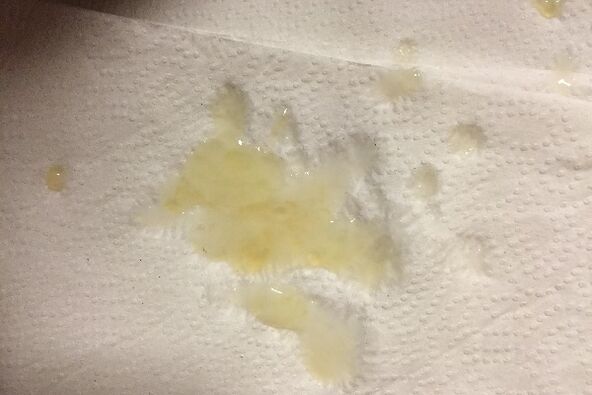
The symptom may appear during the day as well as at the end of each urination. If prostate disease is caused by trichomoniasis, gonorrhea, or other sexually transmitted infections, there may be profuse discharge of a frothy, unpleasant smell of pus.
Symptomatic treatment is performed with uroseptics. Men are advised to observe hygiene and regularly wash the groin area with a solution of chamomile or antiseptic to prevent irritation and maceration of the skin of the penis.
At the same time, it is important to start antibiotic therapy as soon as possible to prevent complications that are fraught with seemingly harmless discharge.
Urine retention
In acute swelling of the prostate gland, urination is impossible because the lumen of the original urethra is completely blocked. The man feels the urge to go to the toilet, there is a feeling of bursting in the suprapubic area.
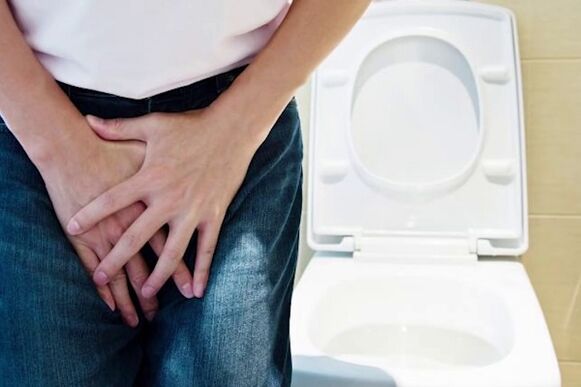
When you try to urinate, the pain intensifies, but to no avail.
Herbal preparations, which contain, for example, sabal fruit extract, help in the fight against urinary retention. They facilitate the emptying of the bladder and relieve the excruciating suprapubic discomfort.
Headache
Symptoms of acute prostatitis include manifestations of intoxication. The inflammatory process in the prostate gland is accompanied by the production of specific biochemical markers that affect the condition of the whole organism.
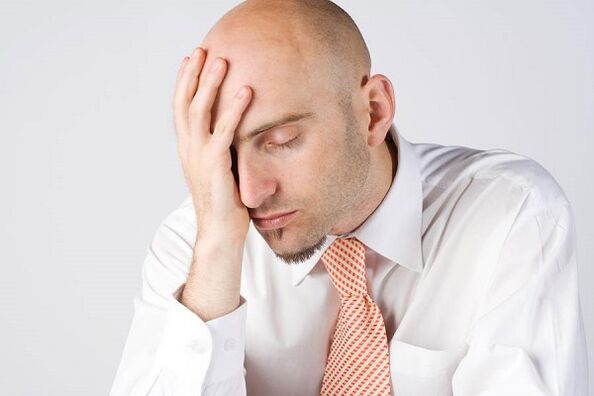
The disease is often accompanied by fever, on the background of which there is a headache with a pressing or narrowing nature.
Analgesics from the NSAID group are suitable for pain relief. If the discomfort is mild, the medicine may be given up.
Painful bowel movement
When the bowel is emptied, there is strong pressure on the inflamed gland, so the man experiences sharp pain. Sometimes the pain becomes so intense that the person tries to limit the urges so as not to feel discomfort.
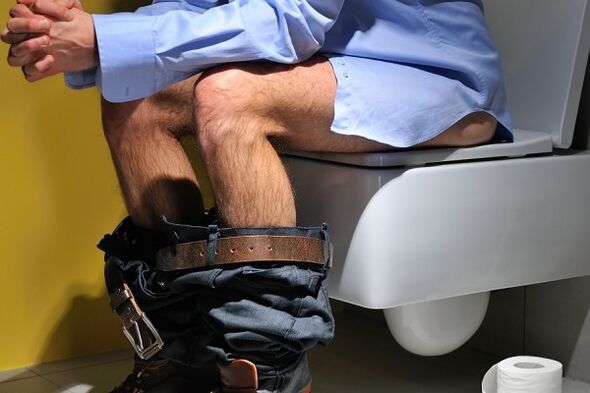
Sometimes prostatitis is observed in prostatitis - "unsuccessful" painful desire to defecate.
Unpleasant sensations cannot be dealt with at home. The pain will disappear only after the acute inflammatory process subsides. Do not hold back the desire to defecate, as constipation may occur, which will worsen the situation.
Lumbosacral pain
An unpleasant symptom of prostatitis is due to the general innervation (supply of nerve endings) of the pelvic organs, due to which the pain spreads to nearby parts of the body.
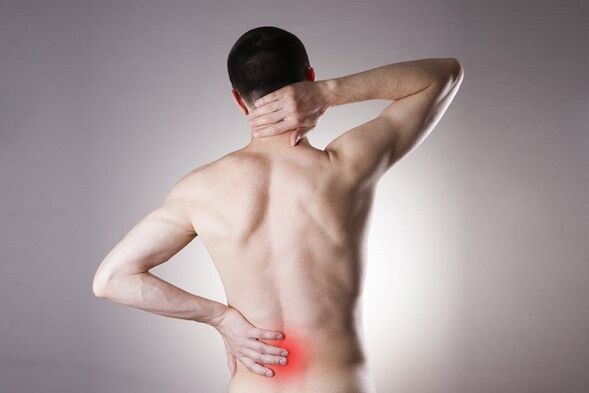
The pain can be dull and painful or sharp. Acute "lumbago" in the lumbar region are also characteristic, which appear during tension, defecation, urination.
To eliminate the symptom, painkillers from the NSAID section are suitable. You should not use warm baths or warming the lumbar area to relieve discomfort, as this can intensify the acute inflammatory and purulent process, accelerating its development.
Pain in the body
The symptom develops as one of the components of the intoxication syndrome in prostatitis. The man complains of discomfort in the joints and muscles: they seem to be twisted, stretched and compressed at the same time.
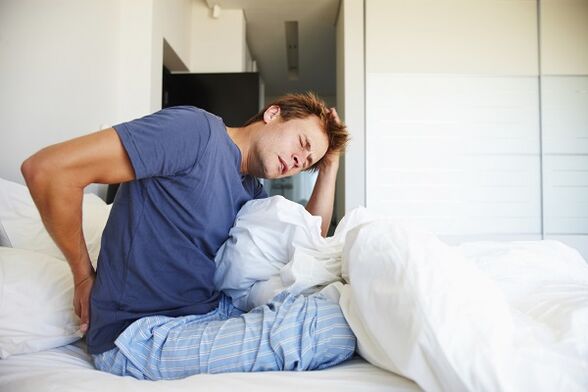
The illness is similar to the onset of a cold or flu.
There are no medicines or folk remedies to eliminate the discomfort. This symptom occurs mainly against the background of fever, therefore, after lowering the temperature (in some convenient way), the pain in the body disappears and health improves.
Diagnosis of chronic prostatitis at home by signs and symptoms
Chronic prostatitis has a number of symptoms, so it can be diagnosed at home, even before you go to the urologist.
Painful ejaculation
Unpleasant sensations bother a man when he approaches orgasm: pulling pains in the scrotum and perineum begin, which are attributed to the penis. The discomfort reaches its maximum intensity during ejaculation, when a man may experience acute spastic pain.
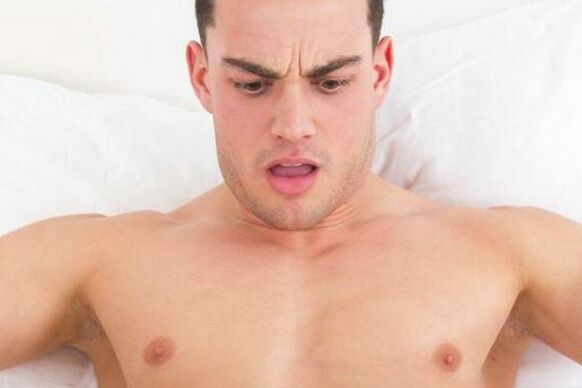
This situation is repeated with each sexual intercourse, but the strength of the painful sensations varies.
To reduce the discomfort, urologists recommend regular sexual intercourse (at least twice a week). This helps to remove the blockages in the prostate gland. After ejaculation, warm sitting baths are useful for relieving pulling pains.
Frequent night trips to the toilet
Symptoms of chronic prostatitis include nocturia - an unusually frequent urination at night. The patient must wake up 2-3 times or more to go to the toilet.
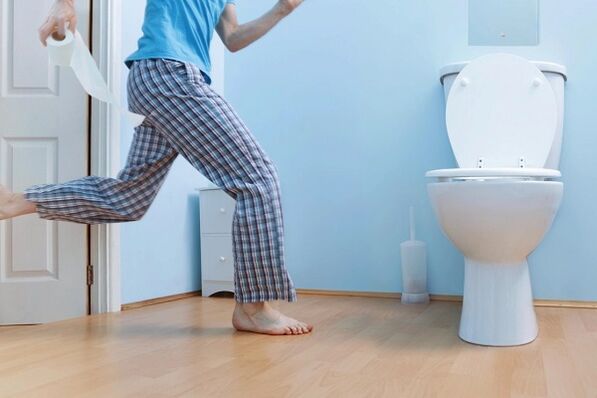
The urge to urinate is quite painful, and the excretion of urine is accompanied by discomfort in the perineum and lower abdomen. The symptom can occur regardless of the amount of fluid consumed at night.
There is no symptomatic treatment. To reduce the frequency of nocturnal awakenings, you should limit drinking water and drinks in the evening, try to completely empty your bladder before bed.
Constipation
The prostate gland increases in size and compresses the rectum, so the act of defecation is difficult. Men complain of constant constipation lasting 3-4 days or more. When you try to strain, the pain appears in the perineum, the sacral area. The symptoms bother a person for weeks or even months.
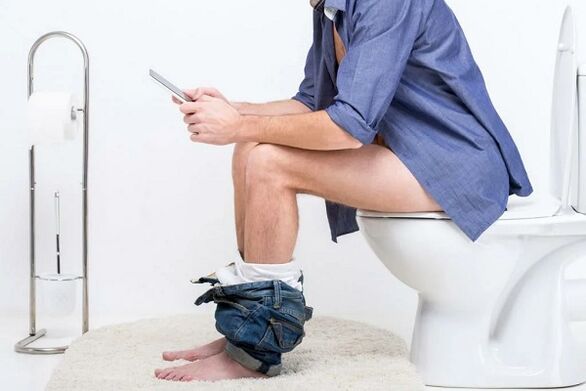
To improve stool, doctors recommend eating more vegetables and fruits, whole grains. These foods are rich in fiber, which increases the volume of stool and makes them softer. Prunes, fresh plums, kefir and other fermented dairy products have a natural laxative effect. For prolonged constipation you can use laxative tablets or suppositories.
Subfebrile temperature
The increase in thermometer readings to 37-37, 5 ° C occurs with exacerbation of chronic prostatitis. In this case, headache, malaise, body aches and other typical symptoms of the disease join.
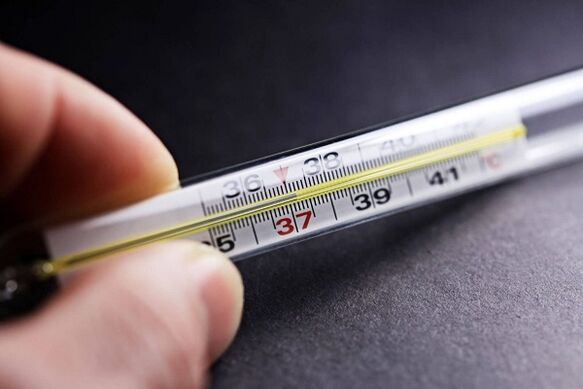
The use of antipyretics is inappropriate at readings up to 38 degrees on a medical thermometer. Recurrence treatment must be given, which is why a subfebrile condition has actually occurred.
Weight loss erection
In chronic prostatitis, sexual problems can occur not only in old age, but also in young men after 30 years.
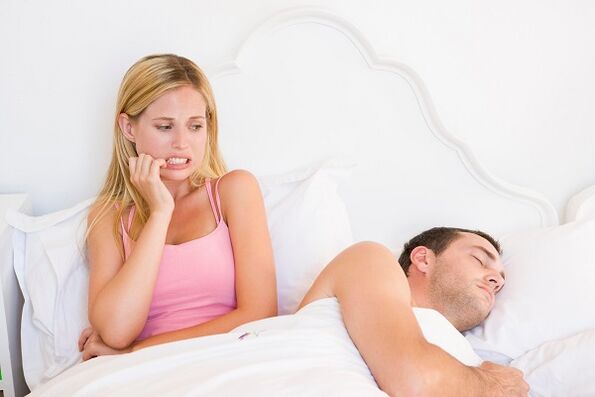
Patients complain that the erection is not firm enough during arousal. This causes both psychological and physical discomfort. Fearing "failure", the man avoids sexual intercourse, which further exacerbates the problem.
There are many folk remedies for treatment than for potency problems. Only a few of them: decoctions of thyme and rose hips, tincture of rowan berries, use of propolis. The man is advised to consume more celery, which has a good effect on erections, and to drink ginger tea.
Reduced productivity
In chronic prostatitis, the man experiences constant weakness, fatigue, irritability and nervousness.
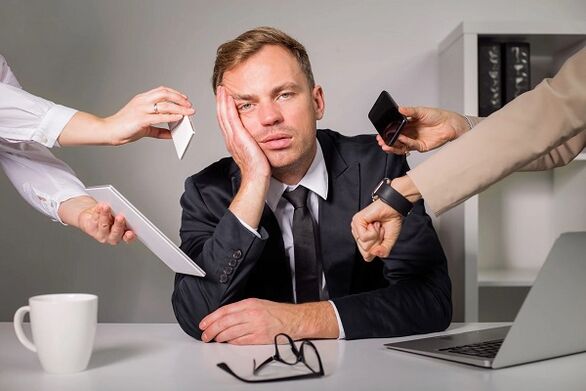
Concentration and memory inevitably decrease and it becomes more difficult to perform normal work tasks. The symptom also applies to physical labor: even with minor sports training or exercise, muscle pain and severe fatigue appear.
During such a period it is important to take care of yourself, to rest abundantly and not to try to perform all tasks to the maximum. After the treatment of prostatitis (or at least achieving a stable remission), the unpleasant symptoms will disappear, after which it will be possible to plunge headlong into work.
Impossibility to conceive a child
With the asymptomatic course of chronic prostatitis, men often go to the doctor complaining that they cannot conceive a child.
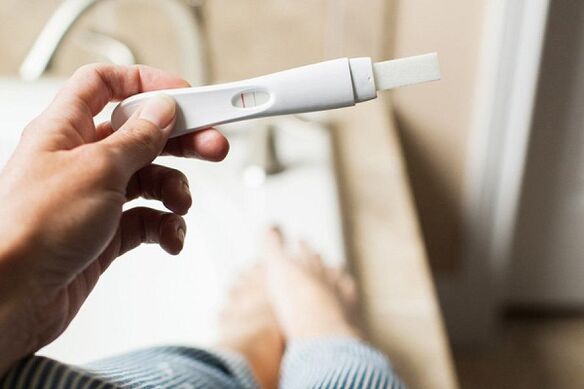
Patients say they have no pain and frequent urination and even during sex everything can be normal. This possibility of developing pathology is considered unfavorable, as it means that the man already has an advanced form of the disease.
The production of viable and active sperm is a serious process that is regulated by the gonads and the brain. No folk recipes and symptomatic remedies will not help in this case, it is important to study and solve the problem at the medical level.
Reviews: the opinion of men in the forums
- "I have signs of prostatitis more than a year ago. At first there was a slight twitching in the groin and perineum, then the pain became stronger. I noticed that I wake up 2-3 times a night to go to the toilet. I didn't pay much attention. I thought I was frozen somewhere or sitting in line. Then the problems in sex begin: the erection is unstable, the sensitivity decreases, there are no live sensations during orgasm. At work, a colleague advised me to bee sting. I took it for several months (in the form of a tincture, I bought it from a local beekeeper), the condition improved, the pain disappeared. "
- "I had pain in the scrotum, perineum and lower abdomen. Sometimes a few drops of pus come out of the urethra. I read reviews on the internet where men describe the same symptoms, go to the doctor and are diagnosed with prostatitis. I know that the disease is serious, so I decided not to delay treatment. The hospital did a bunch of tests and ultrasound prescribed pills. The prostatitis was cured, but intestinal problems began, probably due to antibiotics. Then for another 2 months I had to buy probiotics, then all kinds of kefir and yogurt to eliminate the discomfort in the stomach. "
- "I thought for a long time that I had some digestive problems. I didn't even know about prostatitis - I didn't know that my lower abdomen hurt and my stools were broken. I had exactly these symptoms. I even started going to the toilet a little, but at first I didn't pay attention to that sign. Good thing I decided to go to the urologist anyway. I was diagnosed with chronic prostatitis. I was treated for a long time, took various pills, lit candles. Honestly, I don't even remember the names, it kind of flew out of my head. I feel good now. "
- "I know first hand what prostatitis is. It all started suddenly for me: there was severe pain in the scrotum and suprapubic area, the urge to urinate was literally every 30 minutes. I suffered so much for a few days and went to a urologist. They did a urine test and an ultrasound of the prostate, did a smear test and the doctor wanted to see what was rectally with his finger, but I refused, in general. . . It turned out that he had developed "acute prostatitis". The doctor prescribed antibiotics. After 2 weeks I was completely cured, so far there were no recurrences, I hope there will be no more, it's scary because they say that prostatitis is incurable.
findings
In any form of prostatitis, the use of symptomatic therapy alone is not effective enough. NSAIDs or analgesics will temporarily relieve pain and fever, and uroseptics will help reduce microbial inflammation. But at the same time the pathological process in the prostate gland continues to develop, becoming chronic. As a result, ultrasound changes (tissue sclerosis), erectile dysfunction and the risk of prostate cancer increase.
In order not to lead to the sad consequences of the disease, a comprehensive treatment of prostatitis is necessary. The therapeutic regimen is prescribed by a doctor (urologist, rarely - andrologist), taking into account the characteristics of the disease and test results.



























